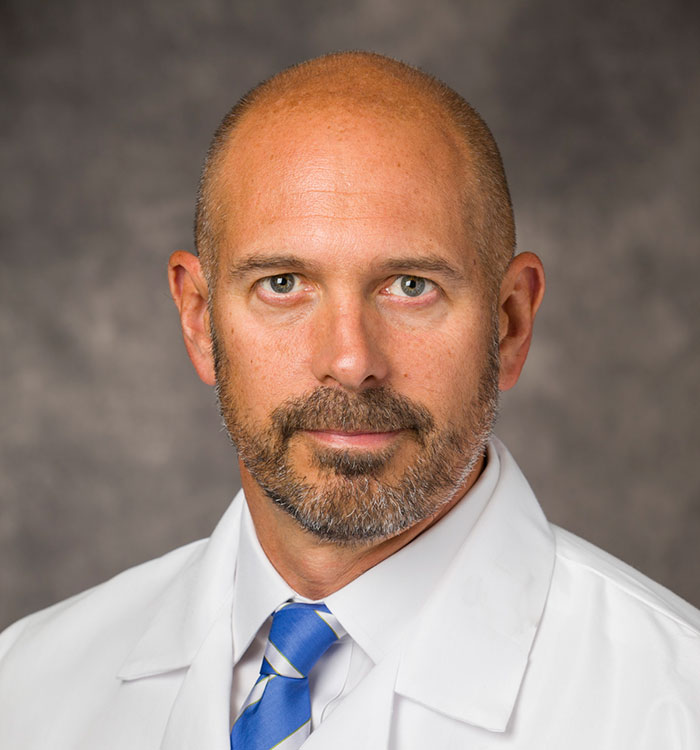Successful Reoperative Surgery
March 11, 2020
UH center takes multidisciplinary approach to highly complex cases
Innovations in Digestive Health | Winter 2020
 David Dietz, MD
David Dietz, MD
Even after a flawlessly executed surgery, complications can occur. Diseases progress, infections develop and previous surgeries simply aren’t successful.
When complications happen, patients may need reoperative surgery. These follow-up or repeat procedures often involve more risk and carry higher rates of complication than the first surgery. They are also long, technically demanding procedures that require highly skilled surgeons and access to a diverse group of specialists.
The Center for Reoperative Surgery at University Hospitals Cleveland Medical Center is one of a few of its kind in the United States with experience in the most complex reoperative surgeries, particularly gastrointestinal and colorectal surgery.
“A large part of my practice involves taking care of patients with complications from prior surgeries,” says David W. Dietz, MD, FACS, FASCRS, Chief, Division of Colorectal Surgery, UH Cleveland Medical Center, and Professor of Surgery, Case Western Reserve University School of Medicine. “These are challenging cases that require experience and expertise on behalf of the surgeon, as well as resources such as nutritional, wound care and psychological support. Few health systems are equipped to do that.”
COMPLICATED CASES
Dr. Dietz says the cases he sees most often include patients who have had anastomotic leaks after rectal cancer surgery, or after ileoanal anastomosis or j-pouch surgery for ulcerative colitis. “These patients often aren’t given an option other than to end up with a permanent stoma,” says Dr. Dietz. “If we can get them into the right hands, we can often redo their anastomosis and avoid a permanent stoma.”
People who undergo continent ileostomy (K-pouch) surgery, which is a type of ileostomy that does not involve an external bag, often develop issues related to valve slippage. When that happens, they need a specialist to perform the repair. Patients from across the United States travel to UH Cleveland Medical Center to receive that care, as there are few remaining centers in the country with the expertise to both create and repair continent ileostomies.
Ileoanal anastomosis (j-pouch) surgery also carries a high complication rate. Anastomotic leak, infection, functional problems and technical error may require some type of revisional surgery.
Patients with recurrent rectal cancer may need complex reoperative pelvic surgery. A multidisciplinary approach is crucial for these patients. “We might need radiation oncologists for interoperative radiation therapy, urologists due to bladder resection, gynecologists and plastic surgeons,” says Dr. Dietz. “We need a team of people willing to take on these challenging cases.”
Paul, an active Air Force member from the Washington, D.C., area, had undergone several abdominal surgeries during the past 10 years with Dr. Dietz due to complications of j-pouch surgery. When a new problem arose last year, local specialists didn’t really know how to help him. He returned to Cleveland to consult with Dr. Dietz, who developed a plan.
“It was a complex procedure,” Paul says. “He assembled a team of about seven different specialty surgeons and got them all up to speed on my case. Fortunately, only five of those surgeons were needed. Because Dr. Dietz had performed my previous surgeries, he knew what was going on and felt confident taking my case. He led the whole team, which is what I was looking for: someone who could think on their feet and make decisions.”
MULTIDISCIPLINARY CARE
Dr. Dietz works alongside Ronald Charles, MD, Colon and Rectal Surgeon, UH Cleveland Medical Center, and Assistant Professor, School of Medicine, to treat patients who need reoperative colorectal surgery. Dr. Charles has had specialized training in surgery for recurrent pelvic cancers, above and beyond his colorectal surgery fellowship. In other situations, Dr. Dietz may call upon experts in different specialties.
The Division of Colorectal Surgery at UH has unlimited capabilities, offering the latest techniques to address more common problems like colorectal cancer, diverticulitis, inflammatory bowel disease and others, as well as extremely challenging situations like Paul’s. “We’re always thinking about who the best person is to take care of each individual patient,” says Dr. Dietz. “Sometimes that means getting patients with complex problems to a highly specialized surgeon at UH Cleveland Medical Center, or it could mean managing their care at one of our community hospitals where their families are readily available.”
As the Center for Reoperative Surgery at UH Cleveland Medical Center develops, Dr. Dietz hopes to expand to include additional services such as surgical oncology and hepatobiliary surgery, as well as redo antireflux, hernia, cardiac and thoracic surgery.
Whether it involves recurrent cancer or failed coronary artery surgery, reoperative surgery carries its own chances of complications. However, if caught in time, the benefits may outweigh the risks. “When physicians see patients with these types of issues, even if you think you can’t do anything to restore quality of life, send them to see us, because oftentimes there is [something we can do],” says Dr. Dietz. “It’s a tragedy when patients never get to a specialist who can potentially help them because they don’t know how to navigate the system."
To refer a patient to Center for Reoperative Surgery at UH Cleveland Medical Center, call 216-553-1976.


